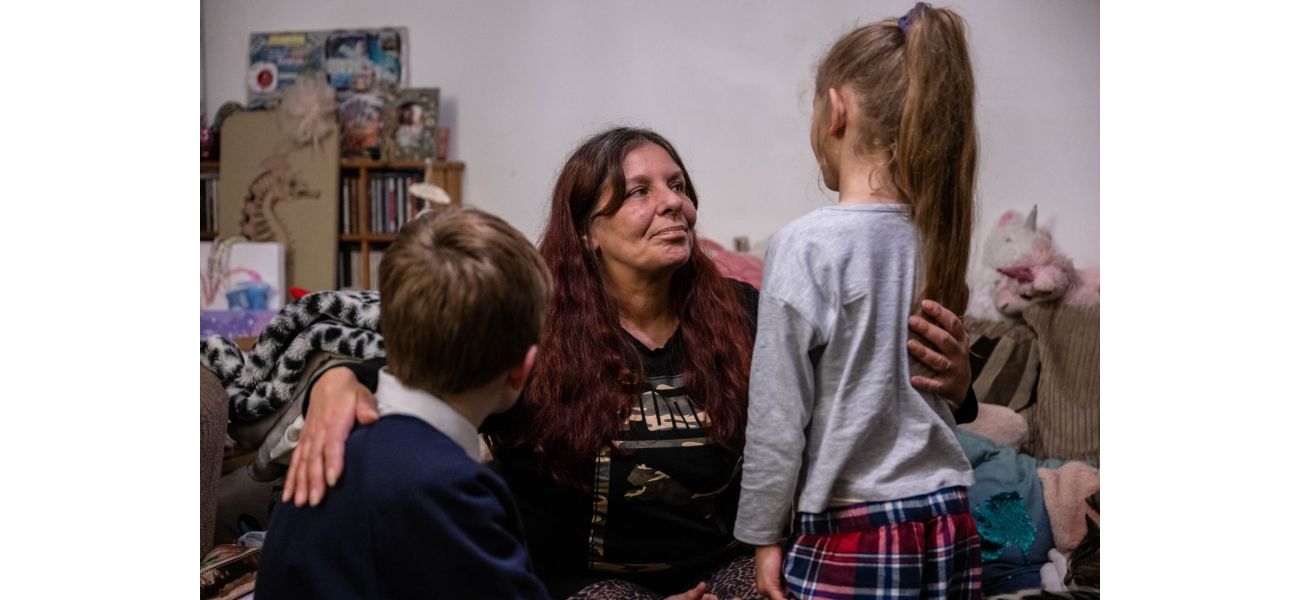Christmas meal relies on items available at nearby food pantry.
Caregivers need support before they reach their breaking point.
December 21st 2024.

When Rebekah's daughter passed away, she was suddenly faced with the daunting task of caring for her two young grandchildren. It was a difficult and emotional time for her, but she knew that she had to step up and provide for the children in the absence of their mother. It was a huge responsibility, but she didn't hesitate to take on the role of a kinship carer - a close relative or friend who takes care of children when their parents are unable to.
As Christmas approaches, Rebekah's thoughts turn to the gifts she will give to her grandchildren. Unlike other grandparents who may be able to purchase the latest toys and gadgets for their little ones, Rebekah's budget is much tighter. Instead of flashy presents, her grandchildren will be receiving practical items like duvets and towels. Rebekah explains that she simply cannot afford to buy expensive gifts, as her sole focus is on providing for the children's basic needs.
This has been the case for the past four years, as Rebekah's limited income barely covers the expenses of running their household. She receives some benefits, but they are not enough to cover the costs of raising a family. As a result, she has fallen behind on bills and has had to turn to food banks and school vouchers to ensure that her grandchildren are fed. It's a constant struggle, and the added pressure of Christmas only makes things more difficult.
In addition to financial strain, Rebekah also faces emotional challenges. Losing her daughter and becoming a kinship carer has taken a toll on her mental health. But despite her own struggles, she remains strong for her grandchildren. She has even taken in her son to help with the children, but with limited space, they all share a small home. Rebekah and her granddaughter sleep in the living room, while her son and grandson each have their own room. It's not ideal, but they make it work.
With Christmas approaching, Rebekah is worried about making the holiday special for her grandchildren. Her teenage grandson often asks for things that she knows she cannot afford, and it breaks her heart. However, she will do her best to provide for them and make the day memorable. She may not be able to give them extravagant gifts, but she plans to add some flair to their necessities, like an Elsa duvet cover instead of a plain one.
But Christmas is not the only time that kinship carers like Rebekah struggle with finances. It's a constant battle to make ends meet, with no guaranteed support from the government. Unlike foster carers who receive both practical and financial assistance, kinship carers receive very little, if anything. This puts them in a difficult position, as they unexpectedly take on the full financial responsibility of raising a child.
Rebekah wonders why the government cannot allocate some of the funds used to pay strangers to care for children in foster care to kinship carers who are willing to take in their own family members. It's a valid question, as kinship carers often face financial hardship and receive little recognition for the vital role they play in keeping families together. Christmas may be a particularly tough time, but the struggles of kinship carers continue all year long.
When Rebekah's daughter passed away, she took on the role of caring for her grandchildren. It was a sudden and heartbreaking loss, but Rebekah knew she had to step up and be there for her family. She became what is known as a kinship carer - someone who takes on the responsibility of caring for a child when their parents are unable to do so.
As Christmas approaches, Rebekah is feeling the financial strain of her new role. While other grandparents may be able to spoil their grandchildren with the latest toys and gadgets, Rebekah is unable to do so. Instead, she will be giving her grandchildren practical gifts such as duvets and towels. She explains that she simply cannot afford to buy expensive presents, as her limited income barely covers the cost of running the household.
Becoming a kinship carer has had a significant impact on Rebekah's finances. She receives some benefits, but they are not enough to cover all the expenses. As a result, she has fallen behind on her council tax and often has to choose between paying her bills and heating her home. The family has even had to turn to foodbanks and school vouchers to ensure that the children are fed.
Christmas is an especially challenging time for kinship carers like Rebekah. The charity Kinship conducted a poll and found that many carers are worried about being able to afford presents and Christmas dinner for the children in their care. Some even anticipate having to use foodbanks or falling into debt just to make the holiday special for their family.
Rebekah's son has moved in to help with the children, but space is limited in the household. Rebekah and her granddaughter have been sleeping in the living room, while her son and teenage grandson have their own bedrooms. Despite the difficulties, Rebekah is determined to make Christmas special for her grandchildren. She plans to add a touch of flair to their necessities, such as an Elsa duvet instead of a plain one.
However, the financial strain has also taken a toll on Rebekah's mental health. She admits that she has fallen into debt and often feels overwhelmed. But she knows that she has to pull herself together for the sake of her grandchildren. She wants to give them a happy Christmas, free from the worries and struggles that she faces every day.
Rebekah also questions why kinship carers do not receive the same financial support as foster carers. She believes that if the government can allocate funds to strangers to care for children, then they should also provide support to kinship carers who are caring for their own family. This financial burden is not only present during the holiday season, but it affects kinship carers all year round.
Lucy Peake from Kinship explains that kinship carers often take on this role unexpectedly and without the financial support that foster carers or adoptive parents receive. This makes the situation even more challenging, as kinship carers are left to support themselves and the children in their care.
Rebekah's love for her grandchildren is undeniable, and she is doing everything she can to provide for them. But she also hopes for more recognition and support for kinship carers like herself, who selflessly step up to care for their family in times of need.
As Christmas approaches, Rebekah's thoughts turn to the gifts she will give to her grandchildren. Unlike other grandparents who may be able to purchase the latest toys and gadgets for their little ones, Rebekah's budget is much tighter. Instead of flashy presents, her grandchildren will be receiving practical items like duvets and towels. Rebekah explains that she simply cannot afford to buy expensive gifts, as her sole focus is on providing for the children's basic needs.
This has been the case for the past four years, as Rebekah's limited income barely covers the expenses of running their household. She receives some benefits, but they are not enough to cover the costs of raising a family. As a result, she has fallen behind on bills and has had to turn to food banks and school vouchers to ensure that her grandchildren are fed. It's a constant struggle, and the added pressure of Christmas only makes things more difficult.
In addition to financial strain, Rebekah also faces emotional challenges. Losing her daughter and becoming a kinship carer has taken a toll on her mental health. But despite her own struggles, she remains strong for her grandchildren. She has even taken in her son to help with the children, but with limited space, they all share a small home. Rebekah and her granddaughter sleep in the living room, while her son and grandson each have their own room. It's not ideal, but they make it work.
With Christmas approaching, Rebekah is worried about making the holiday special for her grandchildren. Her teenage grandson often asks for things that she knows she cannot afford, and it breaks her heart. However, she will do her best to provide for them and make the day memorable. She may not be able to give them extravagant gifts, but she plans to add some flair to their necessities, like an Elsa duvet cover instead of a plain one.
But Christmas is not the only time that kinship carers like Rebekah struggle with finances. It's a constant battle to make ends meet, with no guaranteed support from the government. Unlike foster carers who receive both practical and financial assistance, kinship carers receive very little, if anything. This puts them in a difficult position, as they unexpectedly take on the full financial responsibility of raising a child.
Rebekah wonders why the government cannot allocate some of the funds used to pay strangers to care for children in foster care to kinship carers who are willing to take in their own family members. It's a valid question, as kinship carers often face financial hardship and receive little recognition for the vital role they play in keeping families together. Christmas may be a particularly tough time, but the struggles of kinship carers continue all year long.
When Rebekah's daughter passed away, she took on the role of caring for her grandchildren. It was a sudden and heartbreaking loss, but Rebekah knew she had to step up and be there for her family. She became what is known as a kinship carer - someone who takes on the responsibility of caring for a child when their parents are unable to do so.
As Christmas approaches, Rebekah is feeling the financial strain of her new role. While other grandparents may be able to spoil their grandchildren with the latest toys and gadgets, Rebekah is unable to do so. Instead, she will be giving her grandchildren practical gifts such as duvets and towels. She explains that she simply cannot afford to buy expensive presents, as her limited income barely covers the cost of running the household.
Becoming a kinship carer has had a significant impact on Rebekah's finances. She receives some benefits, but they are not enough to cover all the expenses. As a result, she has fallen behind on her council tax and often has to choose between paying her bills and heating her home. The family has even had to turn to foodbanks and school vouchers to ensure that the children are fed.
Christmas is an especially challenging time for kinship carers like Rebekah. The charity Kinship conducted a poll and found that many carers are worried about being able to afford presents and Christmas dinner for the children in their care. Some even anticipate having to use foodbanks or falling into debt just to make the holiday special for their family.
Rebekah's son has moved in to help with the children, but space is limited in the household. Rebekah and her granddaughter have been sleeping in the living room, while her son and teenage grandson have their own bedrooms. Despite the difficulties, Rebekah is determined to make Christmas special for her grandchildren. She plans to add a touch of flair to their necessities, such as an Elsa duvet instead of a plain one.
However, the financial strain has also taken a toll on Rebekah's mental health. She admits that she has fallen into debt and often feels overwhelmed. But she knows that she has to pull herself together for the sake of her grandchildren. She wants to give them a happy Christmas, free from the worries and struggles that she faces every day.
Rebekah also questions why kinship carers do not receive the same financial support as foster carers. She believes that if the government can allocate funds to strangers to care for children, then they should also provide support to kinship carers who are caring for their own family. This financial burden is not only present during the holiday season, but it affects kinship carers all year round.
Lucy Peake from Kinship explains that kinship carers often take on this role unexpectedly and without the financial support that foster carers or adoptive parents receive. This makes the situation even more challenging, as kinship carers are left to support themselves and the children in their care.
Rebekah's love for her grandchildren is undeniable, and she is doing everything she can to provide for them. But she also hopes for more recognition and support for kinship carers like herself, who selflessly step up to care for their family in times of need.
[This article has been trending online recently and has been generated with AI. Your feed is customized.]
[Generative AI is experimental.]
0
0
Submit Comment





